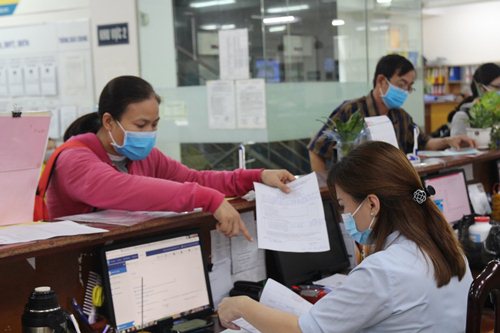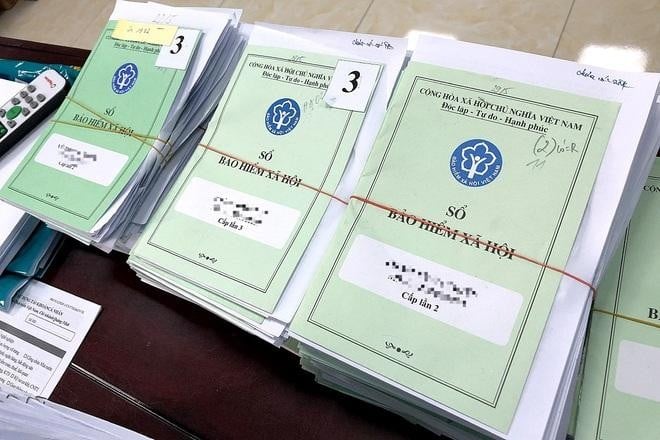Currently, when recruiting, employers often consider the employee's right to pay social insurance, and the employee implicitly understands that this is a benefit that the company gives them. However, few people realize that this is the responsibility of the employer and must be implemented. Failure to do so will result in penalties, according to the law in Vietnam.

Summary of penalties related to the act of "Evasion of paying social insurance" for employees in Vietnam (Internet image)
Specifically, Article 17 of the Law on Social Insurance 2014 prohibits the following acts:
Article 17. Prohibited acts
1. Shirking the payment of compulsory social insurance or unemployment insurance premiums.
2. Delaying the payment of social insurance or unemployment insurance premiums.
3. Appropriating social insurance or unemployment insurance premiums or allowances.
4. Falsifying or forging dossiers in the implementation of social insurance or unemployment insurance.
5. Illegally using the social insurance fund or unemployment insurance fund.
6. Causing obstacles or troubles to, or harming the lawful and legitimate rights and interests of, employees or employers.
7. Illegally accessing or exploiting the database on social insurance or unemployment insurance.
8. Making untruthful reports or providing inaccurate information or data on social insurance or unemployment insurance.
In addition,the Law on Social Insurance 2014 stipulates that employees have the right to participate and enjoy social insurance and health insurance, and employers have the responsibility to pay social insurance according to the provisions of this Law.
According to Article 33 of Decree 28/2020/ND-CP, penalties related to the act of paying compulsory social insurance (social insurance) and unemployment insurance (UI) for employees are as follows:
|
Object |
Violation |
Fine (VND) |
Remedial measures |
|
Employees |
Agreement with the employer not to participate in compulsory social insurance, unemployment insurance, to participate for the wrong people or not to participate at the prescribed level. |
500,000 - 1,000,000 |
|
|
Employers |
Every year, do not publicly post social insurance payment information of employees provided by the social insurance agency according to the provisions of Clause 7, Article 23 of the Law on Social Insurance; |
500,000 - 1,000,000 |
NONE |
|
Failure to carry out procedures to confirm the payment of unemployment insurance for employees so that the employee can complete the dossier to enjoy unemployment insurance according to regulations; |
|||
|
Failure to provide or insufficient information about employees' compulsory social insurance and unemployment insurance contributions when requested by employees or trade unions. |
|||
|
Failure to provide accurate, complete, and timely information and documents related to payment and benefits of compulsory social insurance and unemployment insurance at the request of competent state agencies and social insurance agencies. |
05 - 10 million |
NONE |
|
|
Late payment of compulsory social insurance and unemployment insurance; |
Fine from 12% to 15% of the total amount to be paid for compulsory social insurance and unemployment insurance at the time of making a record of administrative violation but not exceeding 75 million VND.
|
- Forced to pay back the amount of compulsory social insurance and unemployment insurance. - Forced to pay interest equal to 2 times the average social insurance fund investment interest rate of the preceding year calculated on the amount, time of late payment, non-payment, or evasion of payment; if not, at the request of the competent person, the bank, other credit institution, or the state treasury will be responsible for deducting from the employer's deposit account to pay the unpaid or late payment amount and the interest on this amount calculated according to the highest demand deposit interest rate announced by state-owned commercial banks at the time of sanction into the insurance agency's account for 30 days or more. |
|
|
Paying social insurance and unemployment insurance not at the prescribed level is not evasion of payment; |
|||
|
Paying social insurance and unemployment insurance is not enough for the number of people eligible to participate in compulsory social insurance and unemployment insurance, which is not evasion of payment. |
|||
|
Failure to pay compulsory social insurance and unemployment insurance for all employees participating in compulsory social insurance and unemployment insurance is not to the extent of being prosecuted for criminal liability. |
Fine from 18% to 20% of the total amount payable for compulsory social insurance and unemployment insurance at the time of making a record of administrative violation but not exceeding 75 million VND. |
||
|
Evading payment of compulsory social insurance and unemployment insurance but not reaching the level of criminal prosecution. |
50 – 75 million |
The employer must be responsible for paying social insurance for the employee from the time the labor contract is signed. If the employee signs a probationary contract, he or she will not have to pay social insurance. However, the probationary period must not exceed 180 days for jobs of business managers, no more than 60 days for jobs with professional titles requiring professional and technical qualifications of college level or higher, no more than 30 days for jobs with professional titles requiring professional qualifications, intermediate technical skills, technical workers, and professional staff, and no more than 6 working days for other jobs.
So at the end of the probationary period mentioned above, the employer is required to pay social insurance for the employee because this is the responsibility of the employer and is also the default benefit of the employee when signing a labor contract. If employers consider paying social insurance as a benefit that employers bring to employees, it is completely wrong, and employees should clearly understand their rights to participate in negotiations and agreements with employers.
Employers should comply with the law on paying social insurance for employees because, when discovered, in addition to the amount of social insurance payment being collected, they will also be fined a relatively large amount. Reducing costs for businesses by cutting social insurance payments for employees is not a good plan, but it is the wrong step because it has to bear two expenses at the same time.
- Key word:
- social insurance
- in Vietnam
 Article table of contents
Article table of contents










.Medium.png)
.Medium.png)
.Medium.png)
.Medium.png)
